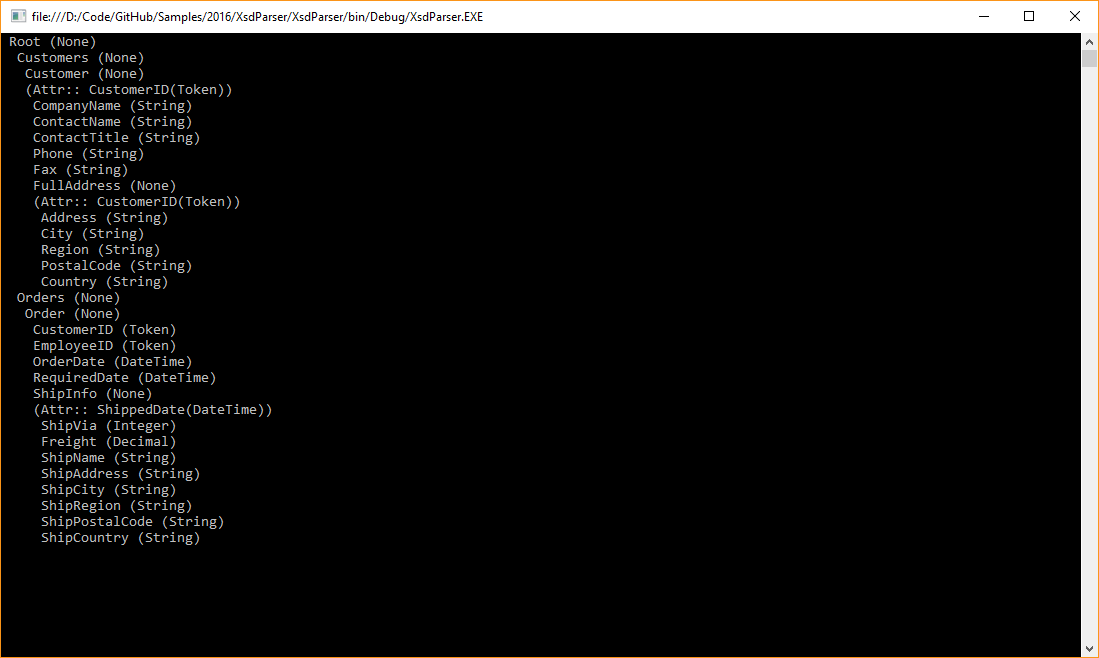XML Schemas
XML can be very verbose and seems to be old-fashioned, but the good part around XML is, that there is a hugh pile of standardized mechanics around it. To query XML documents you can use XPath, for transforming XSLT and for validation XML Schemas or in short a “XSD” (XML Schema Definition).
Parsing the XSD Tree
A XSD is just a XML document itself that describes the your valid XML document tree. Because its just a normal XML document (with a fancy XML-namespace), you could parse it via the normal XDocument, but things are way easier for you when you look at the System.Xml.Schema-Namespace.
Code
The basic code was taken from the MSDN and I added the recursive part to get all possible elements.
/// <summary>
/// Code based on https://msdn.microsoft.com/en-us/library/ms255932(v=vs.110).aspx
/// </summary>
class Program
{
public static void AnalyseSchema(XmlSchemaSet set)
{
// Retrieve the compiled XmlSchema object from the XmlSchemaSet
// by iterating over the Schemas property.
XmlSchema customerSchema = null;
foreach (XmlSchema schema in set.Schemas())
{
customerSchema = schema;
}
// Iterate over each XmlSchemaElement in the Values collection
// of the Elements property.
foreach (XmlSchemaElement element in customerSchema.Elements.Values)
{
RecursiveElementAnalyser(" ", element);
}
}
public static void RecursiveElementAnalyser(string prefix, XmlSchemaElement element)
{
string elementName = prefix + element.Name;
string dataType = element.ElementSchemaType.TypeCode.ToString();
Console.WriteLine(elementName + " (" + dataType + ")");
// Get the complex type of the Customer element.
XmlSchemaComplexType complexType = element.ElementSchemaType as XmlSchemaComplexType;
if (complexType != null)
{
// If the complex type has any attributes, get an enumerator
// and write each attribute name to the console.
if (complexType.AttributeUses.Count > 0)
{
IDictionaryEnumerator enumerator =
complexType.AttributeUses.GetEnumerator();
while (enumerator.MoveNext())
{
XmlSchemaAttribute attribute =
(XmlSchemaAttribute)enumerator.Value;
string attrDataType = attribute.AttributeSchemaType.TypeCode.ToString();
string attrName = string.Format(prefix + "(Attr:: {0}({1}))", attribute.Name, attrDataType);
Console.WriteLine(attrName);
}
}
// Get the sequence particle of the complex type.
XmlSchemaSequence sequence = complexType.ContentTypeParticle as XmlSchemaSequence;
if (sequence != null)
{
// Iterate over each XmlSchemaElement in the Items collection.
foreach (var childElement in sequence.Items)
{
var xmlSchemaElement = childElement as XmlSchemaElement;
if (xmlSchemaElement != null)
{
RecursiveElementAnalyser(" " + prefix, xmlSchemaElement);
}
else
{
// support for XmlSchemaChoise element list
var choice = childElement as XmlSchemaChoice;
if (choice != null)
{
foreach (var choiceElement in choice.Items)
{
var xmlChoiceSchemaElement = choiceElement as XmlSchemaElement;
if (xmlChoiceSchemaElement != null)
{
RecursiveElementAnalyser(" " + prefix, xmlChoiceSchemaElement);
}
}
}
}
}
}
}
}
static void Main(string[] args)
{
XmlSchemaSet schemas = new XmlSchemaSet();
schemas.Add("", XmlReader.Create(new StringReader(File.ReadAllText("Schema.xsd"))));
schemas.Compile();
AnalyseSchema(schemas);
Console.ReadLine();
}
}
Output:

You should see the possible XML elements, attributes and their datatypes, but you have access to all specified schema information from the XSD that you want.
XML Namespaces
XML namespaces are powerful, but can also be pretty complicated for everyone who needs to parse your XML. I guess you could put some evil XML namespaces inside the XSD and things will break with my code. Just be aware of this issue if you are dealing with namespaces.
Visual Studio Tooling
I discovered that Visual Studio ships with a pretty nice XSD editor. But you don’t need to craft the XSD by hand,there are many tools out there that can generate XSDs based on existing XML documents.

Sample XSD
I added the XSD Sample from the MSDN in the demo project. If you found an issue, just let me know.
Hope this helps!